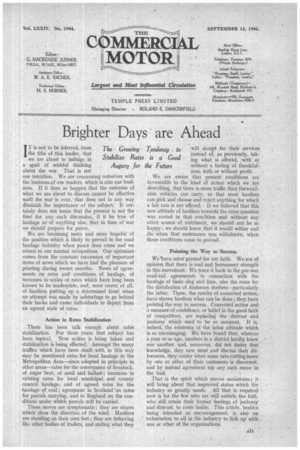Brighter Days . are Ahead
Page 13

If you've noticed an error in this article please click here to report it so we can fix it.
T T is not to be inferred, from The Growing I the title of this leader, that we are about to indulge in Stabilize Rates a spell of wishful thinking Augury for about the war. That is not our intention. We are concerning ourselves with the business of our readers, which is also our business. If it does so happen that the outcome of what we are about to discuss cannot be effective until the war is over; that does not in any way diminish the importance of the subject: It certainly does not mean that the present is not the time for any such discussion, if it be true of haulage as-of anything else, that in time of war we should prepare for _peace.
We are becoming more and more hopeful of the position .which is likely to prevail in the road haulage industry when peace does dime and we return to our normal occupations: Our optimism conies from the constant succession of important items of news which we have had the pleasure of printing during recent months. News of agreements on rates and conditions of haulage, of increases in-scales of rates which have long been known to be inadequate, and, most recent of all, of hauliers putting up a determined front when an attempt was made by subterfuge to go behind their backs and cause individuals to depart from an agreed scale of rates.
Action in Rates Stabilization ,There has been •talk enough about rates stabilization. For three years that subject has been topical. Now action is being taken and stabilization is being effected. Amongst the many traffics which have been dealt with, in this way may be mentioned rates for local haulage in the Metropolitan Area—since adopted in principle in other areas—rates for the conveyance of livestock, of sugar beet, of sand and ballast ; 'increases in existing rates for local municipal and county council haulage,. and of agreed rates for the haulage of coal ; agreement in Scotland 'on rates for parcels carrying, and in England on the conditions under which parcels will be carried.
These. moves are symptomatic ; they are straws which show thedirection of the wind. Hauliers are standing on their own feet ; they are behaving like other bodies of traders, and stating what they will accept for their services instead of, as previously, taking what is offered, -with or without a feeling of thankful , ness, with or without profit.
We are aware that present conditions are favourable to the kind of action which vie . are describing, that there is more traffic than the available vehicles can carry, so that most hauliers can pick and choose and reject anything for which a fair rate is not offered. If we believed that this new attitude of hauliers towards the rates question was rooted in that condition and without any other source of nutriment, we should not be so happy ; we should know that it would wither and die when that sustenance was withdrawn, when these conditions cease to prevail.
Pointing the Way to Success We have suret ground for our faith. We are of opinion that there is real and permanent strength in this movement. We trace it back to the pre-war road4ail agreements in connection with the haulage of basic slag and lime, also the rates for the distribution of Anderson shelters—particularly the latter. These, the results of concerted -action, have shown hauliers what can he done ; they have pointed the way to success. Concerted action and a measure of confidence, or belief in the good. faith of competitors, are replacing the r distrust and jealousy which used to be so rampant. It is, indeed, the existence of the latter attitude which is so encouraging. We have found that, whereas a year or so ago, hauliers in a district hardly knew * one another, and, moreciver, did not desire that • knowledge, they now meet and discuss their differences, they confer when some rate-cutting move by one or other of their customers is discerned, and by mutual agreement nip any such move in the bud.
That is the spirit which moves mountains; it. will bring about that improved status which the industry so greatly needs. All that is required now is for the .few who are still outside the fold, whostill retain their former feelings Of jealousy and distrust, to come inside. This article, 'besides being intended as encouragement, is also an exhortation to all in the industry to link up' with one or other of the organizations.




















































